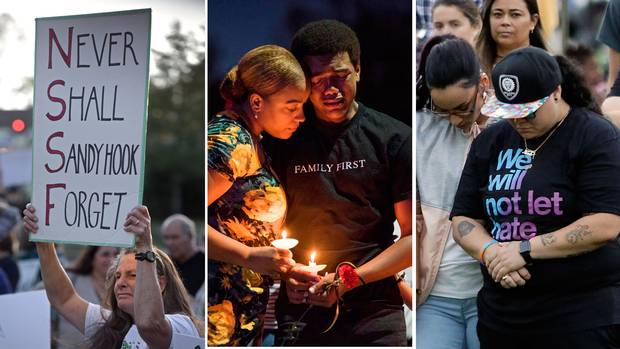As I stand in the terminal waiting for my flight to Las Vegas, my gaze keeps returning to the television screens. The words that flash across the bottom are both awful and familiar.
Once I board the plane, a sense of numbness takes over. I know what is coming.
There will be a focus on the shooter and his motivations. There will be a list of those who are never coming back. There will be terrible injuries, wounds that take years to heal. There will be tales of courage, near escapes, lives spared by chance. There will be a visit by the country's President. There will be vigils, with candles lit against the darkness.
I know "Vegas Strong" will be the city's slogan. There will be public gratitude for police officers and paramedics, trauma surgeons and nurses. Strangers from other parts of the country, seeking to help, will send pizzas to law enforcement or bottled water to hospitals.
I know all this before I land. After arriving, I head to the hospital. Sheryl Terrill is going inside to see her daughter Kristina Staples. Ms. Terrill is shaky, her words coming out in a rush. Ms. Staples was at the Route 91 music festival on Sunday night with her husband. The mother of a 16-month-old, she has been shot in the head and is in a coma. It is unclear whether she will wake up.
"I know where she is and I know she's alive," her mother says. "I hold on to that."
This is the first night of covering the deadliest mass shooting in modern American history, which killed 58 people and injured close to 500. It forms part of a grim pattern: In the past decade, there have been 40 shootings in the United States where a gunman killed four or more people in a public place.
For me, going to Las Vegas is the worst kind of déjà vu. In December, 2012, I was in Newtown, Conn., to write about the shooting at Sandy Hook Elementary School where 26 people were killed, including 20 first graders. In June of last year, I was in Orlando, standing outside another hospital after a shooter killed 49 people at Pulse, a gay nightclub.
Each time, I hoped that I would never write about another such event again. Each time I was wrong. Now, I have come to Las Vegas with a different kind of question: Has the United States accepted these shootings as a way of life?
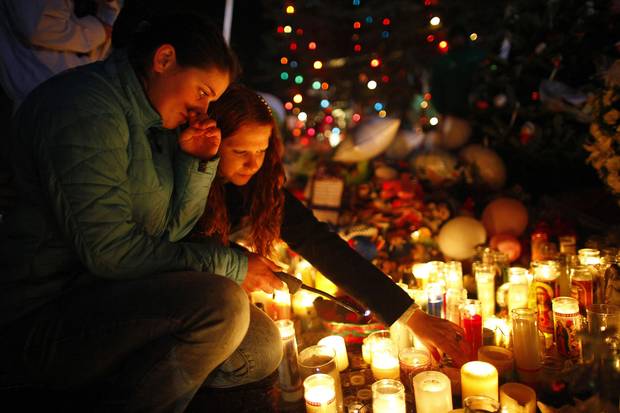
Dec. 18, 2012: Girls light candles at a memorial in Newtown, Conn., set up to honour the victims of the shooting at Sandy Hook Elementary School.
ERIC THAYER/REUTERS
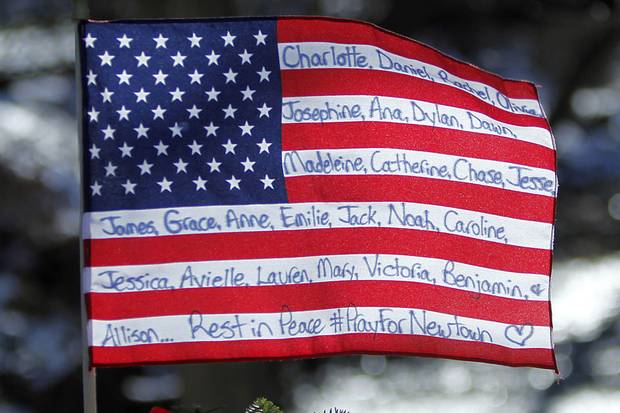
Dec. 28, 2012: A flag in Newtown bears the names of the dead. Twenty children and six adults at the school were killed by a gunman who had earlier killed his mother, and finally killed himself.
CARLO ALLEGRI/REUTERS
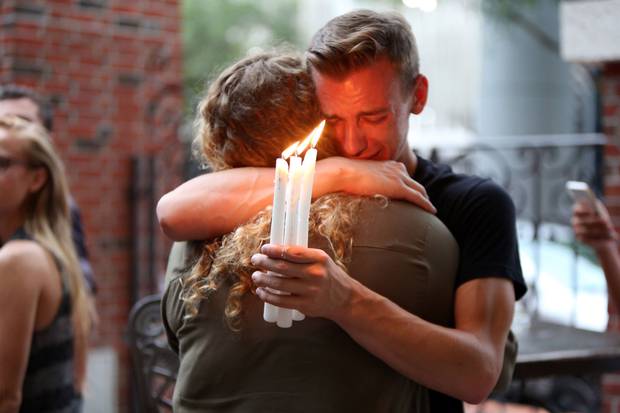
June 12, 2016: Brett Morian, from Daytona Beach, hugs an attendee during a candlelight vigil in Orlando, Fla. A shooting at the LGBT Pulse nightclub killed 49 people. Before this week’s Las Vegas attack, Pulse was the deadliest U.S. shooting in recent history.
Joshua Lim/Orlando Sentinel via AP
'The sky is crying'
I remember sitting at my desk in New York overlooking Times Square and getting a call from my editor on Dec. 14, 2012. What we had thought was an "ordinary" school shooting in Connecticut earlier that morning had turned into a massacre. I jumped in a car, heading north, feeling a combination of dread and nerves.
Even now, it is the worst event I have ever covered. A local nurse told me she had rushed to the school to assist with the wounded only to find there was no one to help. A mother could not stop weeping as she described the twist of fate that had kept her own first grader home from school that day.
Three days later, under a cold rain, Veronique Pozner eulogized her six-year-old son Noah with words that are still with me. "The sky is crying, and the flags are at half-mast," she said. "It is a sad, sad day. But it is also your day, Noah, my little man."
After Newtown, there was a sense that something had to – and could – change. Several new groups were founded to push for tighter restrictions on guns and better resources for mental health. President Barack Obama tried to enact a requirement for universal background checks on commercial gun sales, a measure that polls show is supported by a majority of Americans. Lawmakers also tried to limit the sale of high-capacity magazines. Opposed by the National Rifle Association and other gun rights groups, the measures failed in the Senate four months after the Newtown shooting.
This too became a grim pattern. In the years since Newtown, members of Congress have rejected gun-control measures put forward after other mass shootings, including efforts to once again expand background checks and to allow the federal Centers for Disease Control to conduct research on gun violence. After the shooting in Orlando last year, carried out by an American professing allegiance to the Islamic State, Republican legislators even blocked an attempt to ban gun sales to individuals on the federal terrorist watch list.
"There is a Groundhog Day feel to these mass shootings and the political response," says Kristin Goss, a professor of public policy at Duke University who has written two books on the debate over guns in the United States. "Guns have become a central component of a political identity … [and] it's harder to negotiate over something that's very central to your identity."
(This week, a small opening has appeared: Several senior Republicans and the NRA have signalled their openness to banning "bump stocks," the accessories that allowed the Las Vegas shooter to fire an automatic, military-style stream of bullets into the crowd of concert-goers.)
In Las Vegas, again and again, the acts of ordinary people – who tend to the wounded and dying, open their homes, donate blood and volunteer their time – show the best aspects of humanity. But amid the outpouring of individual generosity, there is also a sense of futility and resignation. People reach out to help the victims, yet feel helpless to tackle the larger problem: that the United States is the only developed country where this type of violence happens with regularity.
Terri Porter, 69, who is herself undergoing chemotherapy, has visited to three local hospitals to offer free rides to relatives and friends of the victims. But she is pessimistic that any policies will change in the wake of the attack. "You feel so powerless," she says. "It will take – I don't know. You just hope you get leaders with some courage."
On Tuesday night in Las Vegas, I go to a prayer vigil at Christ Church Episcopal, a whitewashed church with a tile roof and an enclosed courtyard. Bishop Dan Edwards, who heads the Episcopal diocese of Nevada, warns those gathered in the pews under whirring fans that he is not going to offer a comforting sermon.
For Bishop Edwards, it is a particularly dispiriting moment. In 1966, he was a teenager visiting his brother at the University of Texas Austin when a shooter began firing from the tallest building on campus, killing 14 people. It is considered the first modern mass shooting in the United States and the Las Vegas attack carried its echoes – both perpetrators unleashed terror from on high and far away.
"There's something surreal about having been there for the first mass shooting and now being here in Las Vegas for the biggest one," he says. I ask the bishop what has been achieved in the intervening 51 years. "Clearly, not enough," he says.
On Tuesday night, he stands before a sombre crowd at the church and delivers a message. "What is the purpose of 100-round magazine clips, semi-automatic weapons, and bump stocks that make a rifle shoot like a machine gun?" he asks. "We enact into law our veneration of violence."
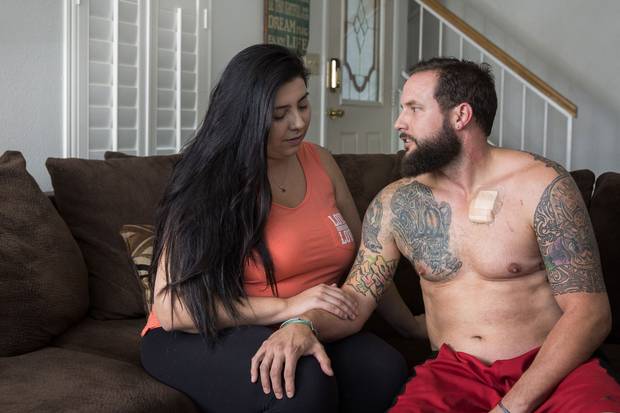
Las Vegas survivors William King and his wife, Kimberly King, sit in their home after returning from the hospital, where Mr. King was treated for a gunshot wound to the chest.
Emily Wilson for the Globe and Mail
A sense of helplessness
One morning, I arrive at the cardiology ward on the fifth floor of Sunrise Hospital and Medical Center to talk to William King, who was shot in the chest at Sunday's concert. He is sitting on a hospital bed, the entrance and exit wounds on his left side covered with square bandages. I ask him how he is holding up.
He begins to cry. "I'm all over the place," he says. "I'm sad, I'm mad. I wish I hadn't seen the things I saw."
Doctors say Mr. King's luck was extraordinary: The bullet passed through his left side from back to front, narrowly missing his aorta. He was hit after he threw himself on top of his wife, Kimberly, trying to shield her as they lay on the ground amid a barrage of gunfire.
With Mr. King holding his wound with one hand and his wife with the other, the couple began to run. Ms. King remembers trying to scream for help but no sound emerging. Next to her, she saw a woman fall down lifeless, shot in the face.
They made it to a loading area of a nearby casino and Mr. King, 38, wondered whether he was going to die. "Is this light going to show up? Is this going to happen?" he recalls thinking. With the help of strangers – an off-duty doctor, a security guard and a Lyft driver – he made it to the hospital.
Ms. King, 26, says she can't shake a sense of fear. Her voice catches as she describes seeing a police officer at the concert, helpless to protect people from the hail of bullets. For the first time in her life, Ms. King wants to buy a gun. It would not have helped on Sunday night, she knows, but next time, she thinks it might. "When you are without a gun and there's a shooter, there's this sense of helplessness," she says.
Our conversation takes me back to the people I spoke to in Orlando last year. They described a tumble into vulnerability and a sense of seeing threats everywhere. A woman whose daughter used to go to Pulse nightclub talked to me about having a panic attack in a restaurant, imagining a gunman might come in and start shooting. A bank teller told me that her adrenaline had surged when an odd customer suddenly grew agitated: Was he a potential shooter?
William King was shot in the chest in Las Vegas. He and his wife describe what happened next
A special awfulness
Each time a shooting such as this happens, a different place is traumatized. And each time, there is a spot where families gather to hear whether this day will be the worst one in their lives. In Las Vegas, it is a corner of the city's Convention Center. In Orlando, it was a seniors centre blocks from the main hospital. In Newtown, it was a firehouse just down the road from Sandy Hook Elementary School.
I remember sitting in crab grass across from the seniors centre in Orlando less than 24 hours after the rampage and seeing the parents of one of the victims emerge with a group of relatives. The mother could not walk for weeping. The father stopped after a few steps and bent over, bracing his hands on his knees, unable to continue.
At the time, the number of lives lost in the Orlando shooting was unfathomable. When the city held a vigil for those killed, a bell tolled once for each of the 49 victims. It felt endless. But a little more than a year later, the carnage in Las Vegas has surpassed that tally – and included four Canadians.
The fact that Las Vegas is a place where people come for fun is its own special awfulness. Its famous Strip is subdued for a day, but quickly returns to something resembling normality. The large screens outside the hotels display messages of condolences and support. But the slot machines still flash and whir and travellers from all over the world are here with something to celebrate. Down the street from my hotel, there is a gun range with a billboard advertising the chance to "shoot a real machine gun." Its parking lot is full.
The country, too, is moving on. After Newtown and Orlando, the shootings dominated the news for days. But this time the focus shifts quickly, as if Americans, briefly united by tragedy, can no longer keep their gaze on what has happened here. The President provides other news: He travels to Puerto Rico. His Secretary of State has reportedly called him a moron. The Russia investigation rolls forward.
Back at Sunrise Hospital, Sheryl Terrill maintains a vigil over her 33-year-old daughter Kristina Staples. At the concert, Ms. Staples had left her husband to move closer to the stage; she loved country singer Jason Aldean, the final act, and wanted a better view.
The bullet that hit her caused a massive brain injury and she fell into a coma. Doctors tell Ms. Terrill, 61, that Ms. Staples may not wake up. If she does, it will not happen for weeks or months, and she may no longer be able to read or walk.
"I want to be thankful that I'm not one of those 58 families who have no one to bring home," Ms. Terrill says. "I can hold my daughter's hand."
She thinks back to when she first heard about the shooting at Columbine High School in 1999. "You feel so bad for the families, but you still think, 'Thank goodness it would never happen to me,'" she says. "And then it does. Then it does."
THE GLOBE IN LAS VEGAS: MORE ON THE MASS SHOOTING
